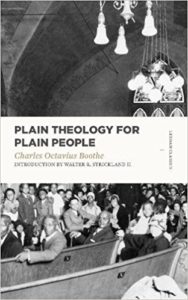Review: Plain Theology for Plain People
Plain Theology for Plain People
By Charles Octavius Boothe (Lexham Press)
 Charles Octavius Boothe was born a slave in Alabama in 1845. He learned the alphabet as a preschooler from letters stamped on a tin plate. Working as a clerk in a lawyer’s office while still in his teens, he read widely and deeply. He went on to become pastor of First Colored Baptist Church in Meridian, Miss., and founding pastor of Dexter Avenue Baptist Church in Montgomery, Ala. Many of his church members were sharecroppers or common laborers with little formal education.
Charles Octavius Boothe was born a slave in Alabama in 1845. He learned the alphabet as a preschooler from letters stamped on a tin plate. Working as a clerk in a lawyer’s office while still in his teens, he read widely and deeply. He went on to become pastor of First Colored Baptist Church in Meridian, Miss., and founding pastor of Dexter Avenue Baptist Church in Montgomery, Ala. Many of his church members were sharecroppers or common laborers with little formal education.
Boothe believed all Christians needed a solid theological foundation on which to build their understanding of God and his plan for their lives. “The doctrines of our holy religion need to be studied in order, according to some definite system; but simplicity should prevail—simplicity of arrangement and simplicity of language,” he said. So, he wrote a theological handbook for common Christians, Plain Theology for Plain People, first published in 1890. Walter R. Strickland II of Southeastern Baptist Theological Seminary discovered Boothe’s book while researching African-American contributions to evangelical Christian thought. A few months ago, Lexham Press reprinted the classic work.
Boothe follows the admonition of one hymn writer who urged, “Make the message clear and plain.” The author’s theological overview is straightforward but not simplistic, concise but not condescending. He cites Scripture to support every assertion he makes. Sad to say, the “plain” language of the late 19th century may seem lofty and elevated to 21st century readers accustomed to tweets and sound bites. Even so, whether readers want to gain a perspective on theology as seen from the viewpoint of disadvantaged and marginalized people, or whether they simply seek a solidly biblical and Christ-centered introduction to systematic theology, Plain Theology for Plain People is a treasure.
Ken Camp, managing editor
Baptist Standard